Nutritious, wholesome meals, packed in convenient and functional boxes from IIITH’s Community Kitchen are snaking their way across Hyderabad to meet some of the demands of the homeless and the hungry. Read more about the efforts of this campus collective which may be low on numbers but high on enthusiasm.
Every morning at 9 am, a Community Kitchen hums into existence on the International Institute of Information Technology Hyderabad campus. A few individuals walk in and begin chopping vegetables. These are handed over to the mess workers who then kickstart the cooking process. Once cooked, another group walks in a little while later and begins to pack the food in neat little boxes. The same process is repeated from 3 pm onwards with the boxed meals ready to be shipped by 5.30 pm. Entirely volunteer-driven, this is an initiative undertaken by the institute in association with the Telangana Social Impact Group (T-SIG) and the state government. The T-SIG currently coordinates all relief efforts pouring in from corporates and other organizations to make sure it reaches the needy. Volunteers from various NGOs transport and distribute the packed meals twice a day.
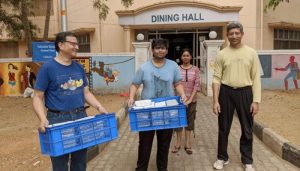
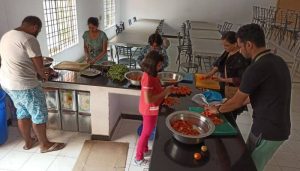
Cooking With Constraints
When the idea of pitching in to assist T-SIG by providing cooked meals was mooted by Prof. Ramesh Loganathan, it found ready takers among those residing on campus. But the institute first considered the viability of such a venture, keeping in mind an already understaffed mess in operation catering to the 70-odd students and others who couldn’t leave the campus for various reasons. It was soon found that some of the spare kitchen capacity along with the sheer will of the volunteer force comprising of faculty, staff, students, and their families could not just make it possible but in fact make it successful. Headed by Prof. Aniket Alam and Prof. Radhika Krishnan, and with support from Prof. Shatrunjay Rawat who is currently in charge of the mess operations, the group managed to cook and pack 2,561 meal boxes in just 8 days alone. An excel sheet that is circulated soliciting community kitchen volunteers for the upcoming week is filled up within seconds. “We have many enthusiastic volunteers on campus, often way more than we need,” chuckles Sireesha, the administrative staffer who maintains the sheet and schedules time slots based on requests received. In these times of the lockdown, with everyone keeping to themselves, she says, “It’s the only time we get to see others and it feels great!”
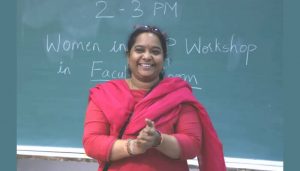
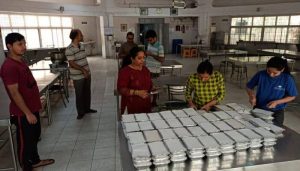
Simple and sumptuous
“The focus is on one-pot meals like khichdi, rajma-chawal, chole-chawal, dalia upma, jeera rice-aloo baingan and others. Basically we try to see that it can be cooked in one big degchi,” says Prof. Alam. One time, the group made poori-sabzi but items like that are a little complicated necessitating a lot more time and effort such as the rolling out and frying of pooris. Each day, approximately 150-160 meal boxes are prepared and dispatched at 12 pm as well as 5.30 pm. The menu itself is well thought of, with the emphasis on nutrition and wholesomeness. Each meal finds a different menu item and even the humble khichdi has different variants. Raj Janagam, who coordinates the efforts on behalf of T-SIG says, “In terms of variety and taste, IIITH’s packed meals have received very good feedback. Most other organizations serve either only khichdi or sambar-rice.” Alluding to the generous usage of vegetables in the institute’s packed meals he says, “When we make pulao or sambar-rice, we add more vegetables to make it wholesome, but that kind of thing doesn’t usually exist in food donations.”
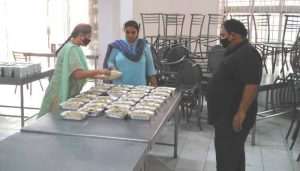
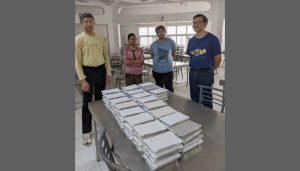
Packing a Punch
The functionality of the packaging material in to which the meals go, has come in for much praise too. A simple, aluminium box with a resealable lid is being held out as an example to other donors on how cooked food ought to be donated. “By putting it in these boxes with a cardboard top sealed on 4 sides, food remains hot and well packed. When these are handed out, people can even put it on their laps or on the ground and eat. If some food is left over, they can seal the lid again and keep it for later. So in that sense, it is very convenient,” says Prof. Alam. “Most of the other donors are using plastic packets or aluminium pouches tied with rubber bands. This is not convenient for people to eat out from. They don’t have the means to pour it out into containers or plates and eat,” says Raj. With rubber bands on the pouches snapping, there’s also the issue of food leaking or spilling out. To address this aspect, the team tries to ensure that the cooked food is neither too wet nor too dry (and unpalatable). “Even with gravy dishes, though they are cooked separately, we mix it with the rice in one big pot and make sure it’s not too wet, so there’s nothing that leaks,” says Prof. Alam.
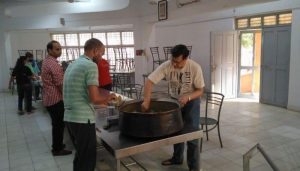
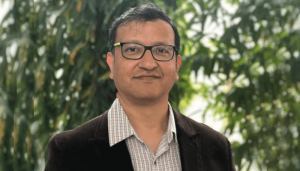
Requests and Resources
Cooked meals go out to various people on the field – the thousands of migrant workers who are stranded due to the sudden lockdown and now living in makeshift camps, daily-wage earners who have lost their livelihoods and thus the ability to access food, the homeless who used to beg for a meal or a living, volunteers who are out there distributing dry rations to families unable to access PDS outlets and even overworked police personnel trying to maintain law and order. The T-SIG group caters across Hyderabad and Secunderabad. On 9th April, in a single day, Raj says that they crossed 50,000 distributions through a single network. “With all networks put together, we make around 60,000 distributions and that covers pretty much all of the twin cities,” says Raj. Remarking that some of the corporates sometimes abruptly cut support, he adds,”In that sense we’re constantly looking out for more support. And then sometimes there are SOS calls too, though fortunately their number has decreased significantly.” Requests have come in now for sourcing hand-soaps and sanitary napkins for distribution and the institute hopes to pitch in to meet these needs and possibly other requirements as well. “Ours (cooked food) is a small contribution in relative terms – there are a few lakh people just in Hyderabad who need help to manage food each day. But given our constraints we have done reasonably well,” says Prof. Alam. Speaking about the collective selfless endeavour, Meenakshi Viswanathan, Head, Resources and Development & Alumni Affairs says, “I’m so proud of the IIITH family and its spirit of giving. Shrama daan – meaning bodily effort, is the highest form of charity. This is such a timely and noble service; coupled with that of donating food, the monies and the goodwill that goes into preparing and packaging it so well.”
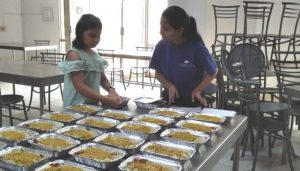


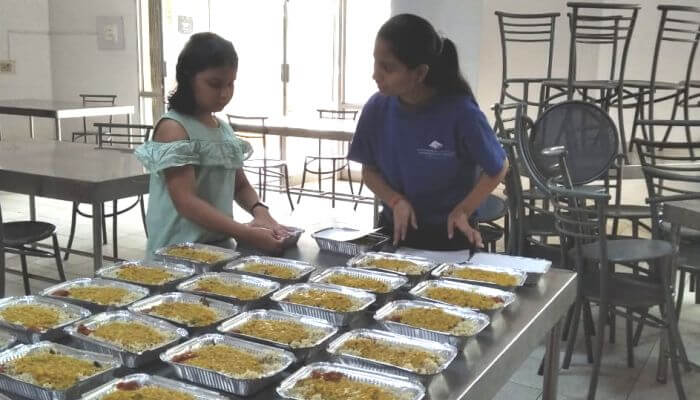
Next post